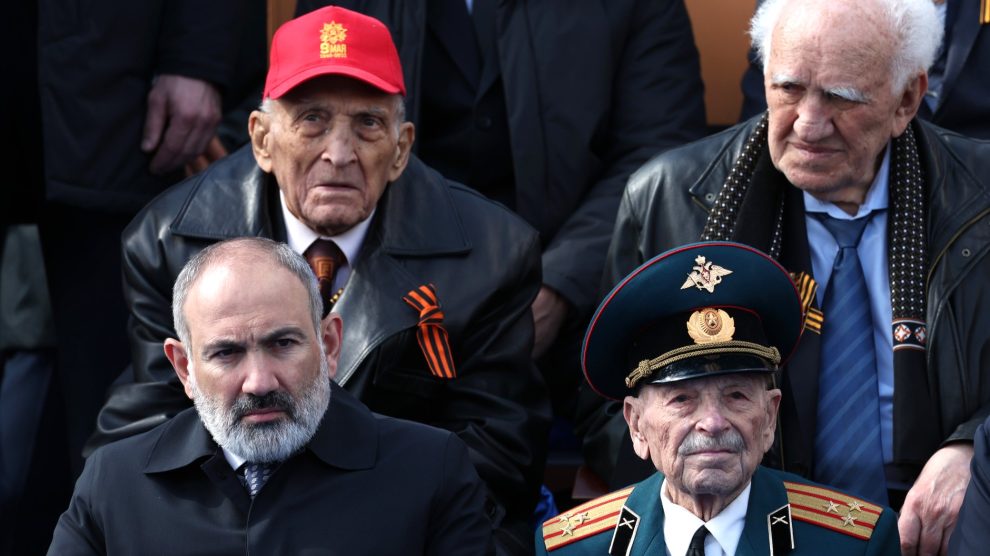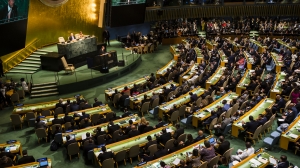A weakened post-Putin Russia would allow Armenia to ‘Armexit’ from the CSTO and EEU and expand economic and trade ties with the EU.
Armenian Prime Minister Nikol Pashinyan is a populist and is prone to taking contradictory stances.
Pashinyan recently warned Armenians that, “If Russia loses the war in Ukraine, I have no idea what will happen to Armenia.”
Pashinyan’s comment has placed Armenia together with China, Belarus, and Iran who have strategic reasons to fear a Russian military defeat in Ukraine. Together with five Central Asian dictators, Pashinyan attended the May 9 celebrations of the great patriotic war in Moscow.
- How the global battle to secure trade routes is impacting the Armenia-Azerbaijan dispute
- Armenia and the Kremlin’s playbook: Myths about national minorities in Ukraine and Azerbaijan
- The EU is flexing its muscles in Ukraine and the South Caucasus. It was about time
Armenia has nothing in common with these five dictatorships and three autocracies. China and Iran seek to prevent Russia’s military defeat because this would destroy their shared goal of replacing the alleged US-led unipolar with a multipolar world.
Belarus and Iran fear Russia’s military defeat because it could lead to regime change. Russia’s military defeat would also put paid to Iran’s dream of becoming a regional military power and nuclear weapons country.
Pashinyan is a long-time civil society activist in Armenia. His democratic politics are closer to European values than those found in Russian President Vladimir Putin’s totalitarian Russia. Five years ago, Pashinyan came to power with the support of young Armenians in a Velvet Revolution (MerzhirSerzhin) that removed a cabal of corrupt and autocratic leaders who had economically ruined the country.
Armenia at the time, which had been tightly integrated with Russia, was in danger of becoming an autocracy run by the warlords who had won the First Karabakh War in the late 1980s and early 1990s.
National identity
Buried in Pashinyan’s comment are two important components of Armenian national identity.
The first is Armenians find it difficult to think outside historical stereotypes of Turkey and Azerbaijan as existential threats to their national security. The 1915 genocide of Armenians is ever present in Armenian identity even though Turkey has been a post-imperial country for the last century. Most Armenians tend to wrongly see Azerbaijanis as ‘Turks’ when they had a long history separate to the Ottoman empire and as part of the Soviet Union.
The second factor is the Armenian perception that its geographic location makes Russia its main protector. Armenia is a founding member of the CSTO (Collective Treaty Security Organisation), a Russian attempt at emulating the Soviet-led Warsaw Pact which during the Cold War opposed NATO.
Armenia hosts two Russian military bases and the FSB, Russia’s domestic security service which in the manner of its predecessor the KGB operates throughout the former USSR, operates Armenia’s borders.
In 2013, Armenia withdrew from signing an association agreement with the EU (European Union). Instead, Armenia joined Putin’s alternative, the EEU (Eurasian Economic Union).
Since 2014, Armenia has voted at the UN in support of Russia’s annexation of Crimea because it wrongly views this illegal military aggression as an example of ‘self-determination’ that could be also applied to Artsakh (the Armenian name for Karabakh).
At the same time, Armenia abstained in the October 22, 2022, UN vote on Russia’s annexation of four south-east Ukrainian regions. Only Belarus of the fifteen former Soviet republics, together with Syria, North Korea, and Nicaragua, supported Russia’s annexation.

An independent foreign policy
Pashinyan’s fear of a Russian defeat is wrong because it would provide Armenia with the freedom to pursue a more independent foreign and security policy. A weakened post-Putin Russia would allow Armenia to ‘Armexit’ from the CSTO and EEU and expand economic and trade ties with the EU.
Nearly as many Armenians live and work in Russia as in Armenia. This would change if Armenia received, like Ukraine, a visa free regime with the EU allowing Armenians to live, work, and study within the Schengen Zone.
Reviving talks on an association agreement and DCFTA (Deep and Comprehensive Free Trade Agreement) with the EU, the world’s biggest customs union, would bring economic development and foreign investment to Armenia. The EEU will not as it is a weak, stagnant and corrupt actor in comparison to the EU.
Contrary to Pashinyan’s comment, Armenia has therefore everything to gain and nothing to lose from a Russian military defeat in Ukraine. Turkey and Azerbaijan are not planning to invade Armenia. Both countries support US and EU-brokered talks towards the signing of a peace treaty that recognises the Armenian-Azerbaijani border. Azerbaijan is willing to provide guarantees for Karabakh’s relatively small Armenian minority, estimated to be around 50,000.
After sixteen months of war, it is impossible to see a Russian military victory in Ukraine. The upcoming Ukrainian offensive will likely presage the beginning of Russian military defeat and possibly regime change in Russia.
Pashinyan should adopt a more strategic approach by grasping US and EU brokered talks to legally recognise its borders with Turkey and Azerbaijan and use the opportunity afforded by a Russian military defeat to return Armenia to the path of European integration that his discredited predecessor withdrew from.
Photo: Nikol Pashinyan (front, left) in Moscow on May 9. Kremlin.ru (CC BY 4.0).
Unlike many news and information platforms, Emerging Europe is free to read, and always will be. There is no paywall here. We are independent, not affiliated with nor representing any political party or business organisation. We want the very best for emerging Europe, nothing more, nothing less. Your support will help us continue to spread the word about this amazing region.
You can contribute here. Thank you.







Add Comment